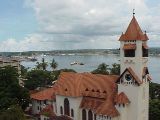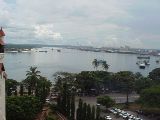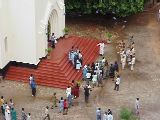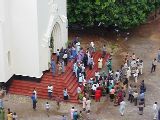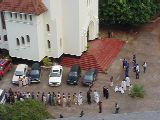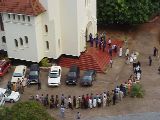|
March 1: A Man Who Needs No Introduction
|
Andrew meets us for tea before today's meeting begin. It was called in response to a
proposal Paul drafted, and while I could participate, Andrew is anxious for me to return to his
office and tend to his ailing computer. He has a large database upon which his organization
depends, there's some question about the quality of his backups, and yes, all the critical
data is stored on the deteriorating drive D.
Paul and Andrew go to the meeting room while I prepare a few documents. After delivering
them to Paul, I head back to the office. The disk analysis has run its course, and the new
map has more black spots than a cheetah. Fortunately, the program successfully moved all the
data to the ever-shrinking good areas of the disk, so I'm able to copy it onto the C drive.
Even as I do this, I can see the black areas spreading on drive D: its demise is coming in
days, perhaps hours, but the data is safe.
I return to the hotel and arrive at the meeting only minutes before its end. Most of the
attendees have never met me, so I'm acutely aware that they may be puzzled by my unnanounced
arrival. I pass a note about this to Paul, who quietly mentions it to the chairman. Lively
discussion continues for several minutes, but soon the chairman calls a pause and asks Paul
to introduce me.
Paul announces, "This is my colleague David. He knows a lot about things that I don't
know very much about, and I know things that he doesn't know very much about."
After a moment of silence, the chairman looks at Paul with a puzzled expression and asks,
"Is that all?"
Paul thinks a moment and says, "uh, yes."
Minutes later the meeting is adjourned, and we all go to the main restaurant for lunch.
I sit next to Andrew and fill him in on the status of his computer. I also give him some
general advice on managing his information resources. This gets the attention of some of
the other attendees, who send questions my way ranging from virus prevention to the best
brand of computer.
Andrew encourages us to stay another day or two in Nairobi, as much to keep me around
to make sure his computer is properly repaired as to continue discussion on Paul's proposal
and various other possibilities for cooperation between our two organizations. After some
persuasion, Paul agrees to stay. A member of Andrew's staff attends to the changes in
our itinerary, and after lunch I get a rare chance to update this travel page with the story
of our trip up to the departure from Dar es Salaam.
One of the hotel's restaurants is advertising a Hungarian festival featuring foods prepared
by Hungarian chefs and music by a Gypsy band. It's not an opportunity that's likely to come
again any time soon, so in the evening we decide to give it a try. The food is good,
particularly the authentic goulash, but the music varies wildly. When the band plays
traditional Hungarian or Gypsy melodies, they're quite entertaining. Unfortunately, they
also play tunes which I suppose are geared toward the tourist trade, and they play them
badly; of these, they wreak the most havoc with "The Girl from Ipanema."
The lead violinist takes particular interest in Paul and me. Actually, there's not much
in the restaurant to compete for his attention: only two tables are occupied. As we dine,
the violinist repeatedly approaches our table, each time coming a bit closer, and gazes at
us as he plays romantic melodies such as "Strangers in the Night." On the third or fourth
approach, Paul and I begin to wonder aloud what he has in mind; he's making a big point of
serenading us as if we were newlyweds. Eventually he comes right up to the table and asks if
we have any requests. We ponder for a moment - anything would be better than more of his
misdirected love songs - and then Paul comes up with an inspired suggestion: "Moscow
Nights," a.k.a. "Midnight in Moscow." I wish I'd thought of that. The violinist doesn't
understand our selection straight away, but after we both request it in English and in
Russian, he leads the band in a smooth, schmaltzy rendition of the song. Afterward, he
solicits another request, but neither of us can think of anything else we to hear other
than their traditional repertoire. The violinist stands by our table for a few more minutes;
he's anticipating a tip, I assume, but he's just as happy to sell me one of his band's
overpriced cassettes.
|
